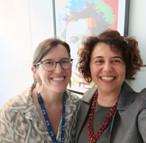Celebrating Effective Supervision in MSCA - MCAA Magazine March 2025
Under the Marie Skłodowska-Curie Actions (MSCA), we strive to ensure that each of our fellows has the resources and support they need to help them develop their research projects, skills and careers. Effective supervision is a key part of this!
A Personal Story
As EU officials with a research background, we both feel deeply about the importance of supervision. Though we shared the good luck to have positive supervision experiences in our own academic careers, we know this is not always the case.
Researchers at all levels, but especially those in the early career phase, need guidance and support in order to develop their research projects and careers. Not just that, but at supervisor level, we see an overloading of tasks, with supervision being crammed in with administrative duties, teaching, research and grant application. Supervisors, like the researchers that they guide, need the time to develop their supervision skills, the resources to support researchers within their team and recognition for the valued contribution that they are making to research through their work.


We know that the MSCA are full of amazing examples of supervision done right. We wanted to bring these to the surface and ensure that more institutions, supervisors and researchers can benefit from their examples.
State of the Art in Supervision
In 2021, the MSCA guidelines on supervision were published. These guidelines contain a series of recommendations for supervisors that could serve as a reference to ensure that researchers receive adequate supervision throughout the duration of their research project. The MSCA community had, of course, long recognised that effective supervision was essential to fostering excellent research and a positive research experience. It was chosen as the key topic of the German MSCA Presidency Conference in 2020, where discussions with doctoral and postdoctoral researchers as well as supervisors from the academic and non-academic sector breathed life into a first iteration of the guidelines.
However, supervision practices and training have changed in the years since these initial discussions, and we want the guidelines to evolve with the needs of our institutions, supervisors and fellows as well as with policy developments such as the revised European Charter for Researchers. We specifically have taken note of the large strides made recently in supervisor training and collective supervision as well as the need expressed by stakeholders for more guidance on how to conduct effective supervision through concrete examples of best practices.
Evaluations of the MSCA by fellows have consistently shown an overall positive perception of their supervision experience. Still, requests for action to set high standards of supervision have been made by the MSCA community. In order to discuss what these standards could be, a satellite event was organised during the MCAA annual conference in Milan in March 2024. This allowed us to discuss key questions related to supervision, hear from experts on good practices being implemented in MSCA projects and reflect on future pathways for further improving our policies in this area.
Supervision practices and training have changed in the years since these initial discussions, and we want the guidelines to evolve
A Collaborative Process
The collaborative atmosphere fostered at this event motivated us to continue working on the guidelines in a participatory way. As our guidelines are designed on the principle that each actor—supervisor, researcher, and institution— brings unique perspectives to the collaborative research effort, we felt strongly that it was necessary to reflect this collaboration in the revision. With the assistance of our National Contact Points, we conducted several one-to- one interviews with leaders in supervision training and support across the research and innovation landscape in Europe to gather input and insights. This was followed by an invitation to a group of experts to join us in our efforts, bringing in their experiences as researchers, supervisors, and institutional research and training support staff. The experts also represented a number of important stakeholder groups, the MCAA of course who we see as our key partners in improving the MSCA programme, but also Eurodoc and the PRIDE Network of professionals in doctoral education. From within the Commission, we also collaborated closely with colleagues in the Research Executive Agency (REA) who manage the implementation of all MSCA-funded projects.
The result was an enriching discussion, online and in person, about the nature of supervision, the (in)appropriateness of the term, the rights and obligations of researchers and many other topics. There was not always consensus among the participants, but the conversations, questions and discussions all served to shape recommendations for a broad range of groups, from a researcher applying to a doctoral programme to the leader of a doctoral school looking to update their framework.
The revised MSCA guidelines on supervision are the result of this process. They focus on the collaborative nature of supervision, the need for robust yet flexible supervision frameworks, a fostering of relationships based on open communication and institutional support structures that facilitate effective supervision through dedicated services, training and community-building.
We invite you to share these guidelines widely and to actively use them to contribute to an MSCA environment where research thrives and careers flourish.

Senem Sanal Erginel
European Commission, Policy Officer
senem.sanal-erginel@ec.europa.eu
senem-sanal-erginel-13210881
Annelies Van de Ven
European Commission, Policy Officer
annelies.van-de-ven@ec.europa.eu
annelies-van-de-ven-6051ba55